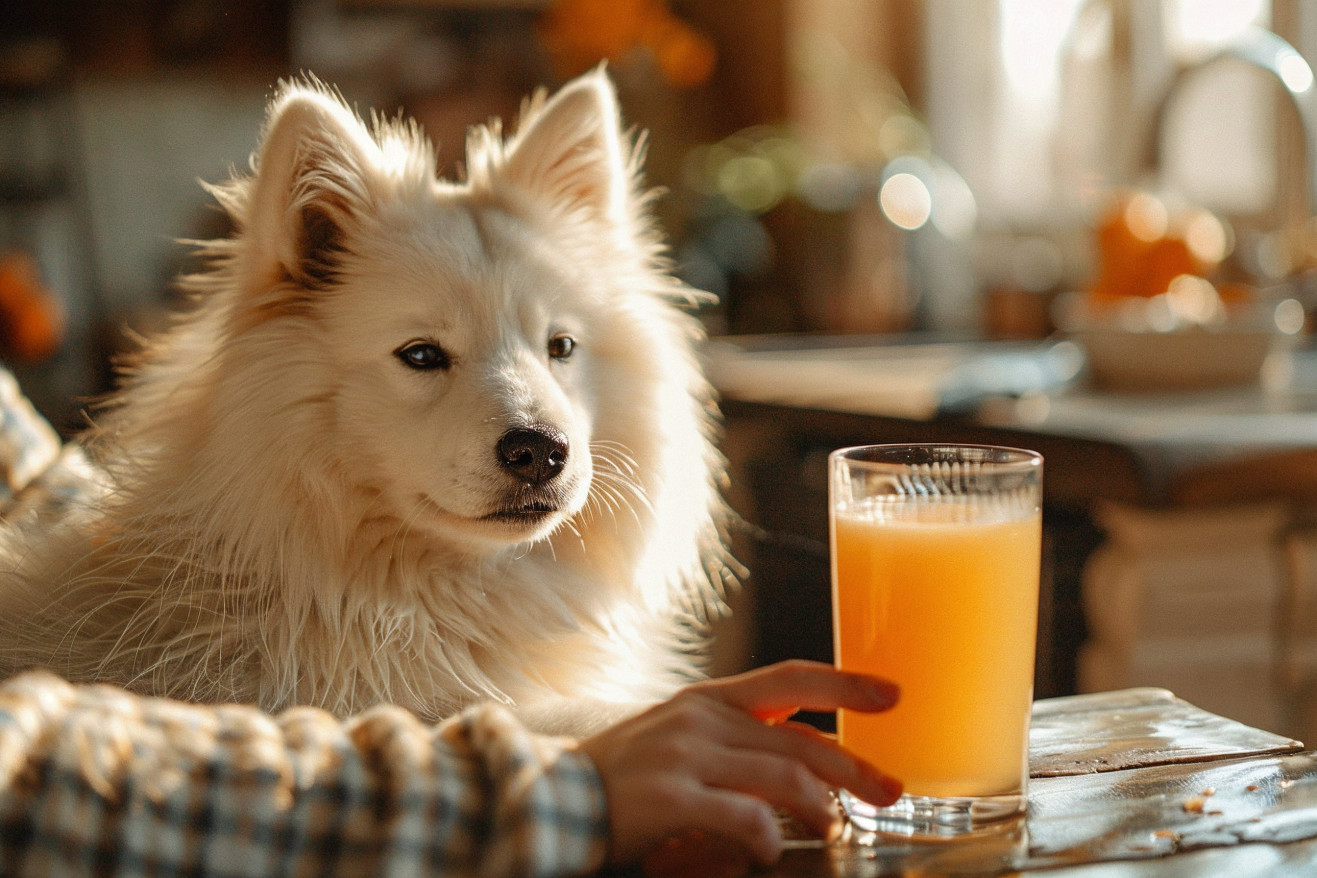Can Dogs Drink Orange Juice? A Look at the Risks and Benefits
2 March 2024 • Updated 2 March 2024

If you’ve ever poured yourself a glass of orange juice and your dog looked at you with those big, sad eyes, you may have wondered if you can give them a sip. While dogs can technically drink orange juice, it’s not recommended by veterinarians due to its high sugar and acidic content, which can lead to digestive and dental issues.
That said, the occasional small amount is unlikely to cause harm, but water is always the best choice for keeping your dog hydrated.
This article will use evidence from a range of reputable sources, including veterinarians and nutritional research, to explain how orange juice impacts a dog’s health. We’ll look at how a dog’s metabolism processes sugar and acid and consider what dogs need in their diet more broadly to determine whether orange juice is good for them. This information will help you better understand what you should and shouldn’t feed your dog.
Can dogs drink orange juice?
What Vets Say About Dogs and Orange Juice
Veterinarians recommend against giving dogs orange juice, mainly because of its high sugar and acidic levels. According to Hepper, while orange juice is not toxic to dogs, it can lead to gastrointestinal upset, which can cause vomiting and diarrhea. The acidity in orange juice can also cause stomach upset, which can lead to dogs drinking more water to try to soothe their stomachs.
Dental health is another concern; the sugar in orange juice can lead to cavities and other dental issues. Over time, the sugar and acid in orange juice can lead to more serious dental problems. A pet expert from Purina warns that while citrus fruits like oranges aren’t toxic, they should be given in moderation because of their sugar content, which can be especially problematic for dogs that are overweight or have diabetes.
If you want to give your dog a special treat, veterinarians recommend giving oranges in small amounts or giving them other treats like carrots. It’s important to make sure that dogs are getting a balanced diet that meets their individual needs, and while fruits can be a part of that, it’s important to make sure that they’re not overdoing it.
To make sure that you’re keeping them healthy and happy, always make sure to get personalized advice from a veterinarian about your dog’s diet.
The Impact of Sugar and Citric Acid on Dogs
While sugar isn’t toxic to dogs, it can cause a range of health issues, including obesity and diabetes, if consumed in large amounts, according to PetMD. As MasterClass points out, these issues not only impact a dog’s well-being but can also lead to other health problems, including heart disease. When dogs metabolize sugars, they experience metabolic changes that can eventually lead to diabetes, especially when combined with a sedentary lifestyle and a high-calorie diet.
Citric acid, which is found in orange juice, also has its own set of potential problems. Although it’s not harmful in small amounts, large amounts can cause digestive issues, including gastritis and allergic reactions in some dogs. In addition, the acidic nature of citrus fruits like oranges can cause digestive upset, leading to vomiting and diarrhea.
Clearly, it’s important for dogs to consume sugars and acids in moderation. It’s also important to talk to a vet before giving dogs any new treats to ensure that you understand the metabolic impact of these substances, which is an important part of being a responsible pet owner. While dogs can eat fruit, it’s important to make sure that they’re consuming it in a way that supports their overall nutritional needs.
Dog Diet and the Nutritional Value of Fruit
According to VCA Animal Hospitals, a complete and balanced dog diet includes proteins, fats, carbohydrates, minerals, vitamins, and, of course, water. While dogs can digest carbs from plant sources, fruits should be added to a dog’s diet with caution because of their sugar content. The Association of American Feed Control Officials notes that a complete and balanced diet is important, and the pet nutrition industry offers many commercial diets that meet these standards.
While fruits can offer vitamins and fiber, they should be given to dogs in moderation. The American Kennel Club says that fruits that are safe for dogs to eat include apples, blueberries, and cantaloupe, all of which are high in antioxidants and dietary fiber. However, the sugar in fruits like oranges can be dangerous, especially in orange juice, which is often stripped of its fiber and therefore has a higher sugar content.
If you want to give your dog fruit, follow the advice of PetMD and give it to them as an occasional treat, making sure to remove any parts that could be toxic, such as seeds or pits.
If you’re wondering whether orange juice is safe for dogs, it’s best to avoid it because of its high sugar and acid content. Instead, dogs should continue to get most of their hydration from fresh water, and fruit should be given as a supplement to a complete and balanced diet.
Understanding How Dogs Digest Sugars and Acids
The way dogs metabolize sugars is carried out through pathways that can have a big impact on their overall health. As one review in PMC explains, a high-fat diet can lead to metabolic syndromes in dogs that are similar to those in humans, such as obesity and insulin resistance. This is especially relevant when it comes to sugar consumption, which can contribute to these syndromes.
Meanwhile, the way bile acids are metabolized is heavily influenced by the bacteria in a dog’s gut. As one review in Veterinary Sciences explains, the metabolism of bile acids by the gut microbiota is important in regulating the physiology and pathology in dogs, which shows how the relationship between the microbiota and the dog is mutually beneficial.
The parallels between metabolic syndromes in dogs and humans, especially diabetes mellitus, are especially strong, as one study in PubMed explains.
Another study in PubMed explains that, just like in humans, obesity and high-sugar diets can lead to diabetes in dogs, which is a condition characterized by insulin deficiency.
This shows that the relationship between diet, the microbiome, and metabolic syndromes is strong, and it’s important for dog owners to make sure they’re monitoring their dogs’ sugar and acid intake. This will help them maintain a balance that will help ensure their dogs stay healthy and avoid more serious medical conditions.
Water and Healthy Snacks for Your Dog
Water is the only thing dogs need to stay hydrated. This makes it especially important to make sure your dog always has access to a bowl of fresh water. There are also healthier alternatives to orange juice and oranges, both of which are high in natural sugars and acidity.
If you want to give your dog a special treat, the AKC suggests sticking to fruits that are safe for dogs to eat, like blueberries, watermelon, and strawberries. Just make sure to keep portions small so your dog can get the benefits without consuming too much sugar. In general, treats should make up no more than 10% of your dog’s daily calories, according to PetMD.
It’s important to talk to your vet before adding new foods or treats to your dog’s diet. They can offer personalized advice based on your dog’s health, breed, and nutritional requirements. By following these tips and talking to a professional, you can make sure you’re being a responsible dog owner.
Getting to the Bottom of It: Dog Health and Orange Juice
So, while orange juice isn’t toxic to dogs, it’s definitely not the best thing to give your furry friend. The experts from Hepper and Purina agree that orange juice’s high sugar and acid content can cause stomach issues, potential dental problems, and even more serious long-term health problems like obesity and diabetes.
This is why veterinarians recommend that pet parents be cautious and selective when it comes to giving their dogs fruit or fruit-based products, as shown by the findings from PetMD and the American Kennel Club.
It’s important for pet parents to stay up-to-date on the latest studies and recommendations from professionals to make the best choices for their pets’ diets. This means ensuring that their dogs are getting the nutrients they need from a well-balanced diet, staying hydrated with plenty of water, and enjoying treats that are both safe and healthy.
By following these guidelines, pet parents can ensure that their dogs are getting the best care and nutrition.


